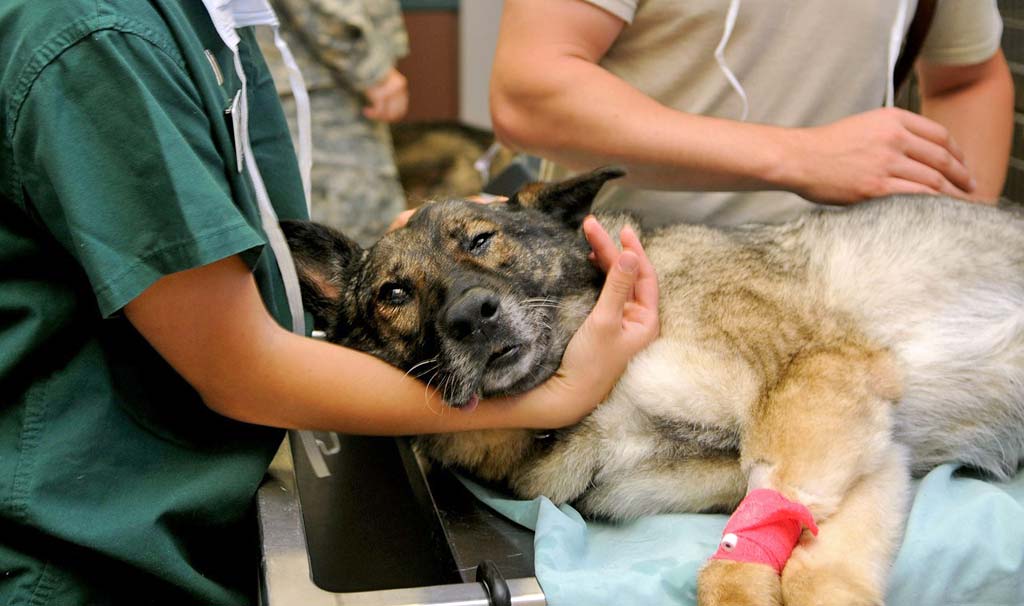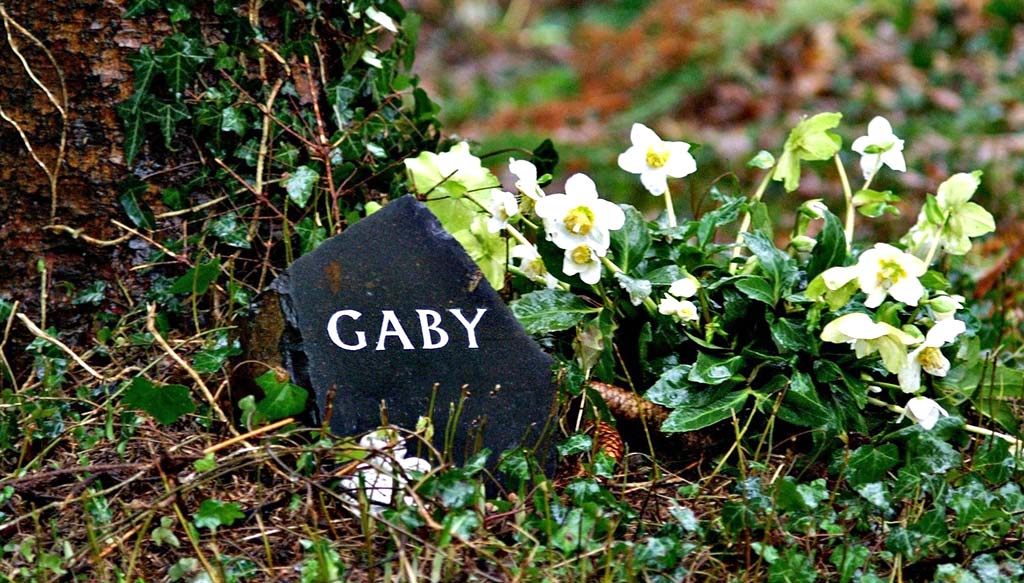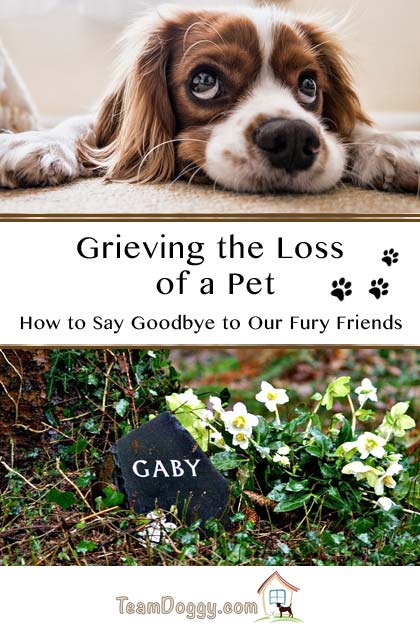
Coping with the loss of a pet can be very difficult. Let’s face it grieving for the loss of a pet can be even more difficult than grieving for a family member. It may sound harsh but sometimes our pets become more than family. The unconditional love they give us creates an undeniable bond.
We come to depend on our pets just as much or more than they depend on us. When they are gone it leaves a big hole.
Most might say bereavement begins after the loss of one’s pet. But the reality is grief can begin much earlier. The day you realize your pet is approaching the end of its life can be a troubling time – even if that day may be many months away.
What can one do to help pass through the grieving process and reach a place filled with happy memories of our precious pet?
This pre-death stage of grief is especially hard because you still have your pet, but the end is inevitable. Sometimes one’s grief is tied to a difficult decision. Do you put down your pet or do what you can to prolong his life?
This grief of impending loss is made more difficult because of this series of tough choices. How much do you want to pay for treatment? At what point will the treatment cause more suffering than actually letting your pet go? At what point do you consider euthanasia?
Sometimes you don’t have much time to make this decision. Other times you may have days, weeks or even months to decide if this option is right for you and your pet.
No matter how much time you need to find the right choice it is best to come up with a plan in advance. You can ask yourself three basic questions when grieving the loss of a pet dog, cat or other fury friend:
1: What is The Best Time To Consider Euthanasia?
When pets become sick probably isn’t the best time to first think about putting them down. If you’ve thought about this issue before you even get a pet you will be a little more prepared when the time comes.
No time is easy to decide to euthanize a beloved pet, but if you have already thought about it in advance it can be a little less stressful.
If your pet does become sick you can start by talking with your veterinarian. They have dealt with this process many many times in the past. They should be able to tell you what type of symptoms to expect as the illness progresses.
What stages does the disease normally take and at what point do symptoms become unmanageable. The last thing you want is for your pet to suffer. If you set boundaries on what you will let your pet endure before euthanasia it can make the decision a bit easier.
Once you have decided the time has come to put down your pet there are a couple of stages that might help with the grieving process.
2: Ask Yourself If You Want To Be There
Being present when a pet dies can be a traumatic event. It can also be a touching time of closeness and a way to say your final goodbyes.
Being there to watch your pet be put down can be hard so it is a tough choice to make, and one you will find yourself stressing over. That is perfectly understandable and normal.
I remember when I was there for the euthanasia of my childhood cat. It was the first time I was present for something like this and I was nervous. That knotty sensation in your stomach when you just don’t know how to feel. “Just be tough, don’t cry”, I kept telling myself.
My cat was always fierce, a real spitfire to people she didn’t know and she was till the end. As the vet gave her the injection she put up one final growl and a hiss. I smiled. She went out the way she lived. It is a fond memory I will hold with me forever.
While the end of a loved pet is hard, if you believe your pet will feel more comfortable or secure in your presence, you’ll probably want to stay, no matter how difficult it will be.
You may prefer to stay away however, if you are concerned that your grief and reaction may upset your pet more than the process itself.
If you choose not to be present, make sure your veterinarian follows humane practices. Some offices hold off on euthanasia until after hours. This could put undue stress on your pet.
Often times vets will have you sit in a waiting area or in your car until they are done, this is a much better way to go about it as you can say your final goodbyes and know your pet isn’t waiting too long as well.
3: What Will You Do Afterward?
Deciding what to do with your pet’s remains is something you want to figure out in advance and not in the moment. Going through grief at the loss of a pet at the same time as making decisions about the remains subjects you to undue stress.
It’s far better to begin discussing your options well in advance. Do you want to make special funeral or private cremation arrangements? Do you want a certain type of urn or casket?
Or perhaps you feel your pet’s soul and personality are not tied to its physical remains, in that case you may be fine leaving the remains with the veterinarian.
Often times, knowing you have provided for your pet’s spiritual needs go a long way toward healing your spiritual wounds during the grieving process.
Grieving the loss of a pet after euthanasia comes with mixed feelings of sadness and relief that our pets have gone on to a better place without the pain and discomfort they may have been feeling late in life.
But there is still a sense of loss, perhaps anger, and loneliness. What is the next step in the healing process?
What Steps Can You Take to Heal When Grieving for the Loss of a Pet?
Grief often hits us surprisingly hard even for pet owners who have experienced the death of many pets over their lifetime. The loss of a deeply bonded pet can even be significantly more distressing than the loss of a family member. Mentally it doesn’t feel like it should but grief hits us in unexpected ways.
You may find that your usual calming, self-soothing activities do not work. You may feel you have lost the capacity for finding comfort. Ultimately, you need to support your body so that it supports you while you deal with the loss of your pet. Go back to the basics: rest, nourishment, hydration, and exercise.
Aside from taking care of yourself during this difficult time there are other activities that might help.
1. Focus on the small things in life: take time to enjoy a cup of coffee, read a good book, or take a walk through the woods paying attention to the smallest details around you. Live in the moment.
2. Nourish love in your life. The empty hole in your heart left behind after losing a pet can’t be filled. But you can make your heart bigger than the hole. Grow love and make your heart bigger than the loss.
3. Help others who are grieving. Look for a local pet loss support group. If you find close relationships with others who have lost a pet you can be there for them in their time of need.
4. Share stories about your pet. Pay tribute to your pet by telling stories and memories of your time together with friends and family.
5. Sometimes a pet loss grief counselor can help. As with any stressful time in your life talking about your feelings with someone trained in grief counseling can help.
6. Take some time off and give yourself time to grieve. You may not feel like doing much of anything in the first stages of grief. Give yourself that time to heal.
7. List what you are thankful for each day or keep a gratitude journal. Say or place affirmations around the house. By repeating encouraging words it can help us boost the feel good endorphins in our body.
8. Be creative by putting together a photo book, write a poem, create a touching meme, or plant a tree, flower garden or perennial. Keep your pet in your memory by placing their collar or piece of fur in a scrapbook, or even keep their tags on your key chain.
9. Support animal kindness products and projects. Make a donation in your pet’s name or donate a bench at their favorite park.
10. Spend time with others who understand what it feels like to lose a pet. Those that have experienced the depth of the bond between pets and humans will understand what you are going through.
Grieving the loss of a pet after euthanasia or natural causes isn’t something you have to do alone. Many of us have experienced the death of a fury friend. There is solace in numbers. You will find a way to remember the warmth and love your pet had given you through out his life with joy instead of sadness.
Just remember you are never alone. And you are never unloved.
If you’ve lost a pet recently or even in the distant past feel free to share with us what has helped you find a happy place.












6/26/2019 I lost my cat. The pain has manifested from emotional to physical. I went from crying & crying to having digestive problems and headaches. I have lost grandparents family friends and more but I never have felt like this before. Its a shock to me. My cat meant everything to me.
He was put down because we found out he had bone cancer (His jow was almost gone and he couldn’t eat. Weird thing is he was still active. Putting him down makes me feel like I let him down. I could not be in the room when they did it. I guess I am a coward. I feel like I failed. He was my best friend. I can’t imagine how parents feel when they lose a child. Something you love is gone. I am angry on top of being sad.
Since I first took him home I always said “He was a gift”. I don’t have children so my cat was spoiled but not bratty. I miss him. I am not ruling out getting another cat. However I am burnt out on a litter box patrol. Plus for 8 years I have had cats on daily medications. I need a break from that.
Thank you for sharing Stanton. I know it is painful to lose a pet and we all feel for you. While it might not help in the moment knowing your cat is finally free from pain I hope is some consolation. And in no way did you let him down by putting him down, he is now at peace.
Hopefully the good memories you hold in your heart will help you heal from your loss. And you can smile at all his playfulness and the comfort you have enjoyed over the years with “your gift”.